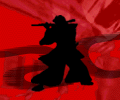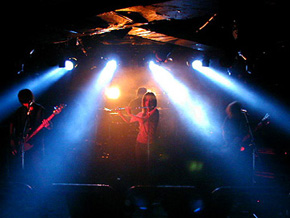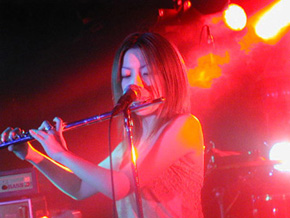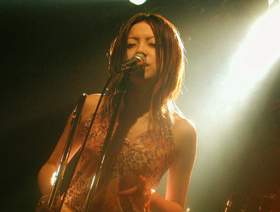Home > English > Music > Interview with Schlaf
Japanese music ain’t just J-Pop.
 Interview with Schlaf
Interview with Schlaf
Tokyo, 31th May
Wednesday 20 August 2003, by
Japanese music generally does not export itself easily out of home, most of the time it is so bad you understand why but unfortunately it is also the case for groups there that deserve a lot more. After listening to Schlaf you realise that all you need to do is to dig a little deeper to find the good stuff...
It was hard to find the meeting place with Naho. The group Schlaf had a photo exhibition of its previous concerts at "The Sugar Water", a tiny bar off the main boulevards of downtown Shibuya in Tokyo. Now this neighbourhood is usually known for its bustling nightlife, but I was wandering in a very quiet area, one of those small residential neighbourhoods that make up most of Tokyo, and make you completely forget you are in a megalopolis.
As a "Gaijin", or foreigner, I did not know my way around town and had been as such restricted to the more obvious and accessible forms of entertainment, like nightclubs and Karaoke (Being a Catholic, I already absolved myself for that one).
But on May 19th 2003 I saw Schlaf playing Live at La Mama, Shibuya. Only then did I have the same kind of evening I really missed back in Europe: Concert halls and bars, and believe me Schlaf is a powerful antidote for anything you may have come across in Japanese mainstream music.

Toru, the group drummer, admitted Schlaf didn’t care much about categorisation and refused to call itself anything. And though their music is definitely inspired by the better sides of pop-rock music, he did have a point.
Three guys, one girl. Drums, bass, guitar, vocals and a classical flute. The first album, Effects, starts with the flute in Instrumental, but is followed by heavier beats. By the time you reach the fifth song, the hardcore guitar riffs make you wonder what happened to the flute, until Naho’s voice comes back to replace it, a clear voice brought back and forth by a willful breathing. It is truly beautiful to listen to her sing even if, like me, you can’t understand the lyrics.
The second album, Holy, Holy has definitely more energy and intensity, but you can also clearly hear the instruments balancing each other in a more subtile way. Naho switches more regularly between vocals and flute playing. The main part of the tracks is followed by the four instruments going solo or in pairs of two, exchanging and passing on the song.
The bad thing is that the two first albums have only 4 to 5 tracks. The third album will have a lot more and will be out at the end of 2003, but now back to the interview made after the concert, in May...
A Mexican beer each in our hand, I sat with Naho across a bench in the middle of the white exhibition room. The walls were covered with pictures of their sessions, concerts, and the time spent in between.

What is Schlaf?
Naho: Well it means "Sleep now" in German...The group started in 1998 and the bassist we had at the time was basically the one behind the idea. Since then, he had to leave and we’ve had a hard time finding bassists since then...we’ve had four bassists so far, and the present one, Ryuugi, has been with us since summer 2002.Toru was on and off the project at first but then became a full time drummer.
You use your voice in a particular way, and the flute gives the songs a really original tone. Have you looked into other musical styles and instruments in your music?
Naho: When the band started and we were able to play live, I actually played keyboards, but that was only experimental, I must have played three or four times. I think we feel comfortable now with the regular drums, bass, guitar and vocals, and the flute comes in regularly for the special touch we like to give to our music.

You’ve been playing live for nearly five years, and by listening to your first two albums your music has definitely evolved. What do you think the future will bring?
Naho: Well Music has been in my life since childhood, and I really can’t imagine doing anything else besides composing, playing and most of all listening to it. We do one or two concerts a month, but the thing is that we still can’t live off our music, and all the band’s members have an arubeito, (another German-inspired word...) the part-time job which helps us make ends meet. Our first album was self-produced, and the second was produced by Heinee which allowed us to sell in music shops and department stores. For our third album we were able to sign a contract in summer 2001 with Scudelia Elektro, who also produce Spiral Life, a band we all in Schlaf look up to.
By the way, what are your influences?
Naho: Well apart from various Japanese bands, we listen a lot to Radiohead, and Bjork definitely inspires us a lot...I guess I am also still very much influenced by the amount of Western 60s Rock music my father used to listen to when I was a kid. We listen to a lot of music separately but when we compose I guess we don’t feel like really imitating others. We are right now in a heavy writing period for our next album end of 2003.
If you want to know more about Schlaf, their music, or even better have the chance of being in Tokyo to listen to them play live, go to Schlaf’s Website in Japanese and a little bit of English